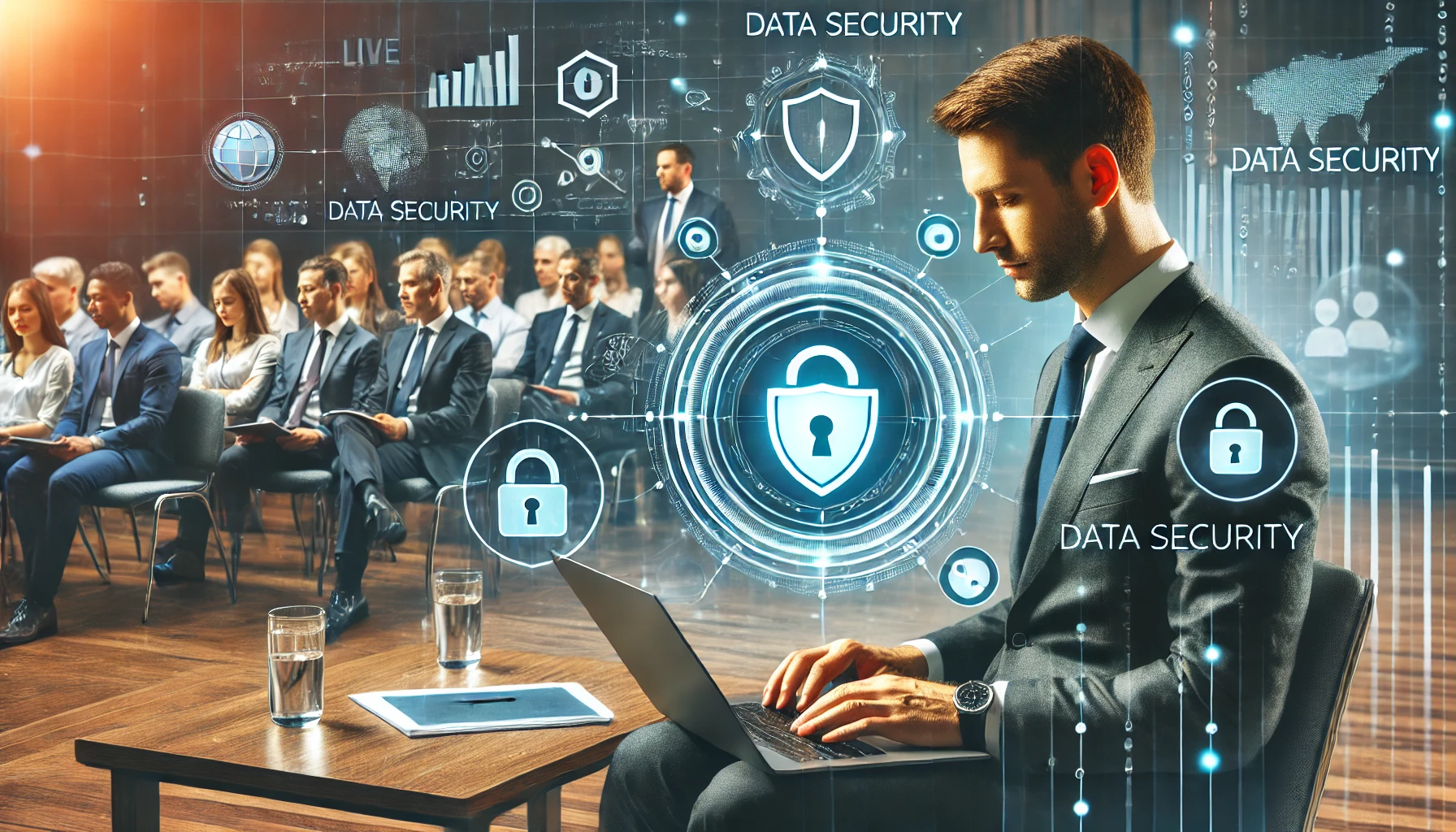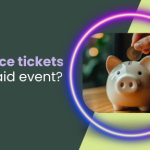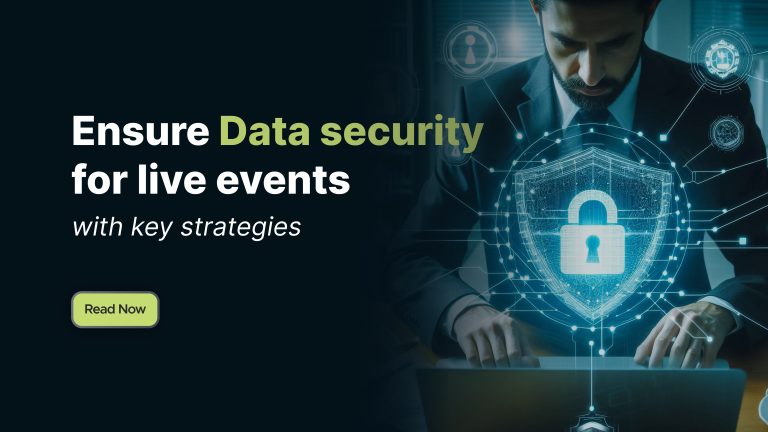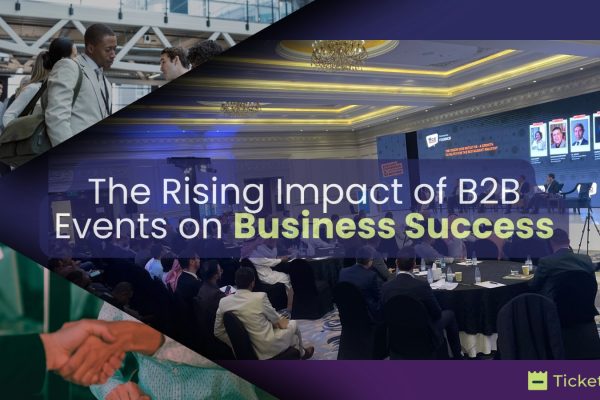Event management has grown in many ways due to today’s technology. This has increased attendee satisfaction and improved functionality. However, this shift or transition to the digital world also poses significant risks to data security. Data loss can lead to financial, opportunity, and reputational harm, making information security essential. This makes it vital to ensure information security. Securing the event protects your attendees and staff and helps build trust and loyalty. Thus as an event organizer, data security is no longer an option – it’s a mandate.
According to a 2023 survey, 93% of event organizers cited data security as a critical concern for their events
Identifying and Understanding Types of Event Security Threats

Physical Security Challenges
Guarding is an essential part of the protection of the events.
Unauthorized Access and Crowd Control: These are about ensuring security. They aim to prevent trespassing and limit crowd size. Accreditation companies are essentially independent bodies that verify whether organizations meet specific standards and competencies to perform particular functions. They act as third-party evaluators, ensuring that businesses, institutions, or individuals are qualified to operate in their respective fields.
Protecting Valuable Assets and Equipment: To protect costly assets and personal property from theft or loss.
Health and Safety Considerations in the Post-Pandemic Era: Health and Safety Considerations in the Post-Pandemic Era are about responding to new guidelines. These rules aim to protect all individuals attending the event.
Digital Security Risks
Cyber threats are now complex and more advanced than ever. Attendee information, including personal details, payment information, and dietary restrictions, is highly valuable to cybercriminals. A data breach can lead to identity theft, financial loss, and reputational damage for the event organizer.
Data Breaches and Cyber Attacks: Organisations must shield confidential data from hackers in society to prevent data breaches and cyber-attacks. Event organizers and attendees are often targeted with phishing emails designed to steal credentials or download malware.
Payment Processing Vulnerabilities: Preventing Internet fraud and monetary loss in online transaction processing. CNP fraud, chargebacks, and data breaches are common payment processing vulnerabilities in the event industry.
Social Engineering Tactics Targeting Events: Social Engineering Tactics Targeting Events raise awareness among staff and attendees. They teach about phishing scams and other tactics used by hackers. These attacks can target both event staff and attendees through phishing emails, impersonation, or pretexting. By educating attendees and staff about these tactics, event organizers can significantly reduce the risk of falling victim to cyberattacks.
Ticketmaster Cyberattack that affected more than half a billion consumers.
A recent report has exposed an incident in which hackers reportedly breached Ticketmaster, a global ticketing service. Experts estimate that the attack stole individual records of more than 500 million customers, believed to have occurred several weeks ago. A cybersecurity research group known as VX-Underground was able to identify the individuals who took responsibility for the breach.
Lessons Learned – Key Takeaways for Improvement
The Ticketmaster data breach highlights the need for effective measures to safeguard customer details in the digital age. Key takeaways include:
Proactive Security: It is high time for organizations to adopt preventive measures such as yearly system reviews and risk detection tests.
Rapid Response: It is crucial to address breaches as early as possible to prevent further consequences and maintain customer confidence.
We must also inform affected customers. This will help restore their confidence and them how to protect themselves.
The recent Ticketmaster case, where it faced an alleged cyberattack, should remind everyone that cybercrime is common. The broad scope of the breach proves once again that it is impossible to let your guard down when it comes to protecting personal data. From this case, organizations can learn and keep their customers and reputation safer in the future by increasing the security measures taken.
Key Strategies for Safe Event Organisation
Next-Generation Ticketing Systems
Up-to-date ticketing systems improve security and the end-user experience like-
QR Code and NFC Technology Implementation: These are secure, contactless entry solutions that are difficult to mimic or replicate in any way.
RFID Solutions for Seamless Access Control: Employing the use of RFID technology for tracking and real-time access control.
Balancing Security with User Experience is key: It’s also vital to ensure that no security measures will harm the attendees’ experience.
Two strong procedures for identifying the users
Authentication control measures are important in preventing unauthorized access to user accounts and event data.
Two-Factor Authentication Benefits: It will also include an additional level of protection beyond the use of a password. For example facial recognition
Event Platforms’ Best Practices for Secure Login: Teach users to create and select strong passwords. Additionally, disable accounts after numerous failed login attempts.
Managing User Permissions and Access Levels: This section is about managing user permissions and access levels. The controls install user role-based restrictions. They limit access to sensitive information.
Exploiting Advanced Technology to Boost Event Security
Encryption and Safe Conveyance Gating
SSL/TLS Implementation for Event Websites: Secure information sharing between users within the event website to prevent the interception of the data.
Secure Messaging Platforms for Staff and Attendees: Encrypted communication is designed to prevent the leakage of confidential data.
VPN Usage for Remote Event Management: Secure remote access to the systems used in events.
Apps for Small Business Security
Wearable Technology for Access Control and Payments: Smartwatches or wristbands provide biometric access to secured areas. They also enable seamless payment processing.
Biometric Authentication in Event Scenarios: It introduces two-factor authentication using fingerprints or face recognition. This boosts security.
Wrap-Up
Security is vital to event management. It builds trust between you (event’s organizer), participants, and stakeholders. Security of data shouldn’t be just a side note or something that you do in your event management plan to avoid, but it’s also for creating trust with clients and attendees. Follow these key security strategies. They will make events safer and bring the long-term benefits of better security. This commitment to protecting sensitive data will lead to stronger relationships. It will also lead to greater success in the event industry.





